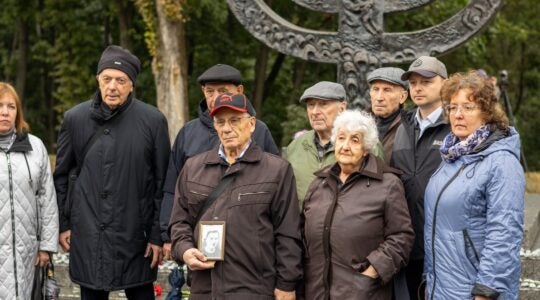(JTA) — The chief rabbi of Moscow condemned the honoring in Ukraine of nationalists whose troops massacred Jews.
Rabbi Pinchas Goldschmidt, who is also the president of the European Conference of Rabbis, spoke of his “concern” over the trend in an interview Tuesday with JTA during a gathering of the standing committee of the Conference in Vienna.
Goldschmidt was referring to a minute of silence observed on May 25 in memory of Symon Petliura, a 1920s statesman whom a Russian Jew killed 90 years ago because the killer blamed Petliura for mass murders of Jews committed in the years 1917-1921 by militias under Petliura’s command.
A French court acquitted the killer in 1927 in what many interpreted as confirmation of Petliura’s culpability for pogroms that claimed the lives of 50,000 Jews. Earlier this week, a government official said Kiev would name streets after Stepan Bandera and Roman Shukhevych, Ukrainian nationalists who collaborated with Nazi Germany and whose troops also killed Jews.
“Russian Jews and Ukrainian Jews share our concern by this celebration of the memory of known anti-Semites and collaborators,” Goldschmidt said, noting that Ukraine has a Jewish prime minister, Volodymyr Groysman.
“We are counting on Ukrainian Jews to stop the revisionist commemoration of the Holocaust,” the rabbi said.
In Ukraine, celebrations of controversial figures like Petliura have become more widespread since 2014, when a revolution spearheaded by nationalists swept from power former president Viktor Yanukovych, who was accused of being a corrupt Kremlin stooge. They are held in high esteem for their opposition to Russia.
Ukrainian Jewish leaders are split on this issue, with the Ukrainian Jewish Committee condemning it, whereas the Vaad Jewish association calling the preoccupation a distraction from working on a harmonious future in an independent multicultural Ukraine.
At the meeting in Vienna, 40 members of the standing committee of the Conference of European Rabbis discussed threats facing the continent’s Jewish communities, including the targeting of Jews over Israel by Islamists and the rising far right.
Last month, a candidate from Austria’s far right Freedom Party, which the local Jewish community has shunned for what the community called neo-Nazi tendencies, lost the second round of the presidential election by less than 1 percent of the vote.
“It’s a definite sign of the difficult times and the fear of many Austrians of Islamic radicalism,” Goldschmidt said about the nationalist party’s popularity. He added the shift to the right was also occurring among some Jewish voters.
The keys to solving both the Islamic threat and the “dangerous backlash” it is producing, Goldschmidt said, are education and dialogue.
JTA has documented Jewish history in real-time for over a century. Keep our journalism strong by joining us in supporting independent, award-winning reporting.





